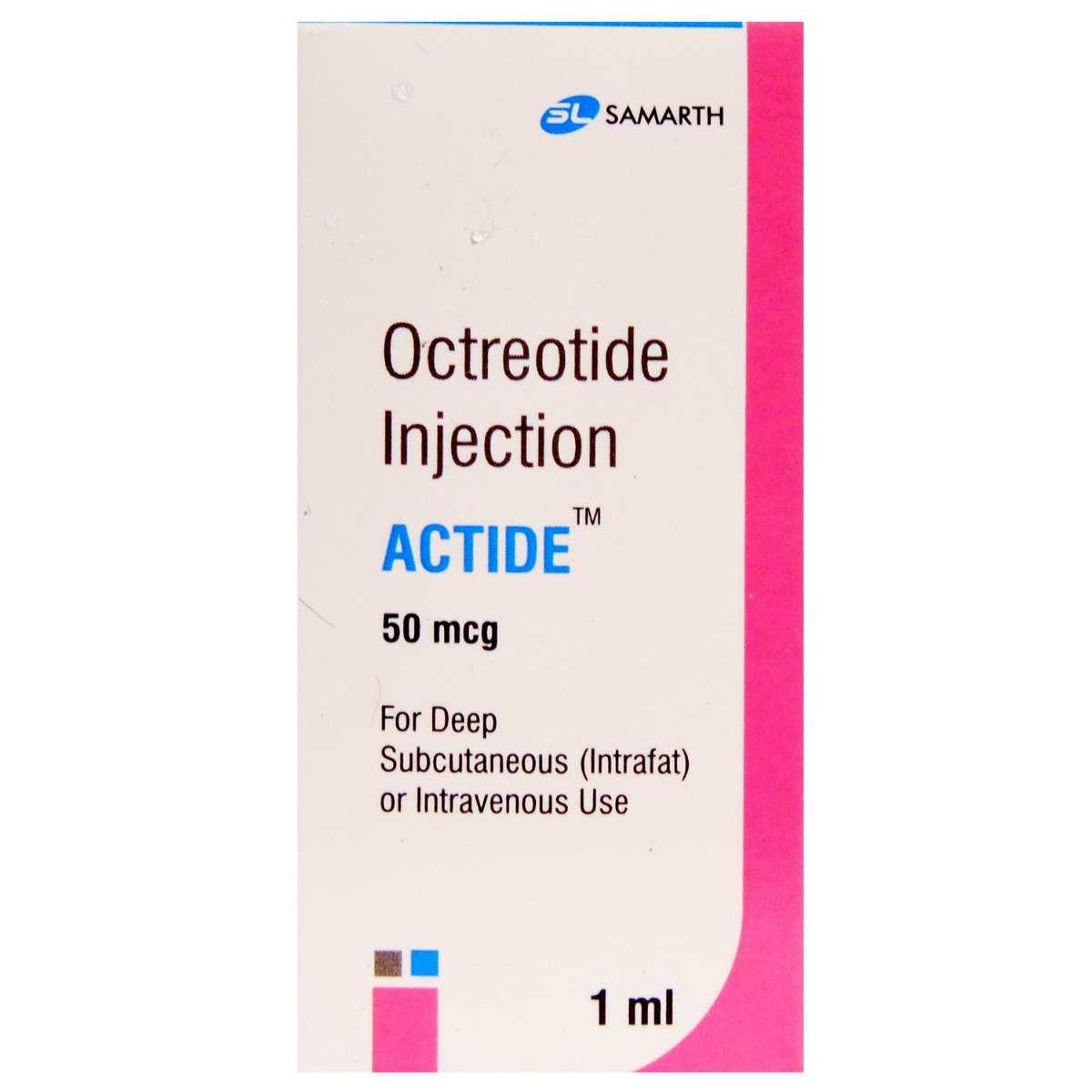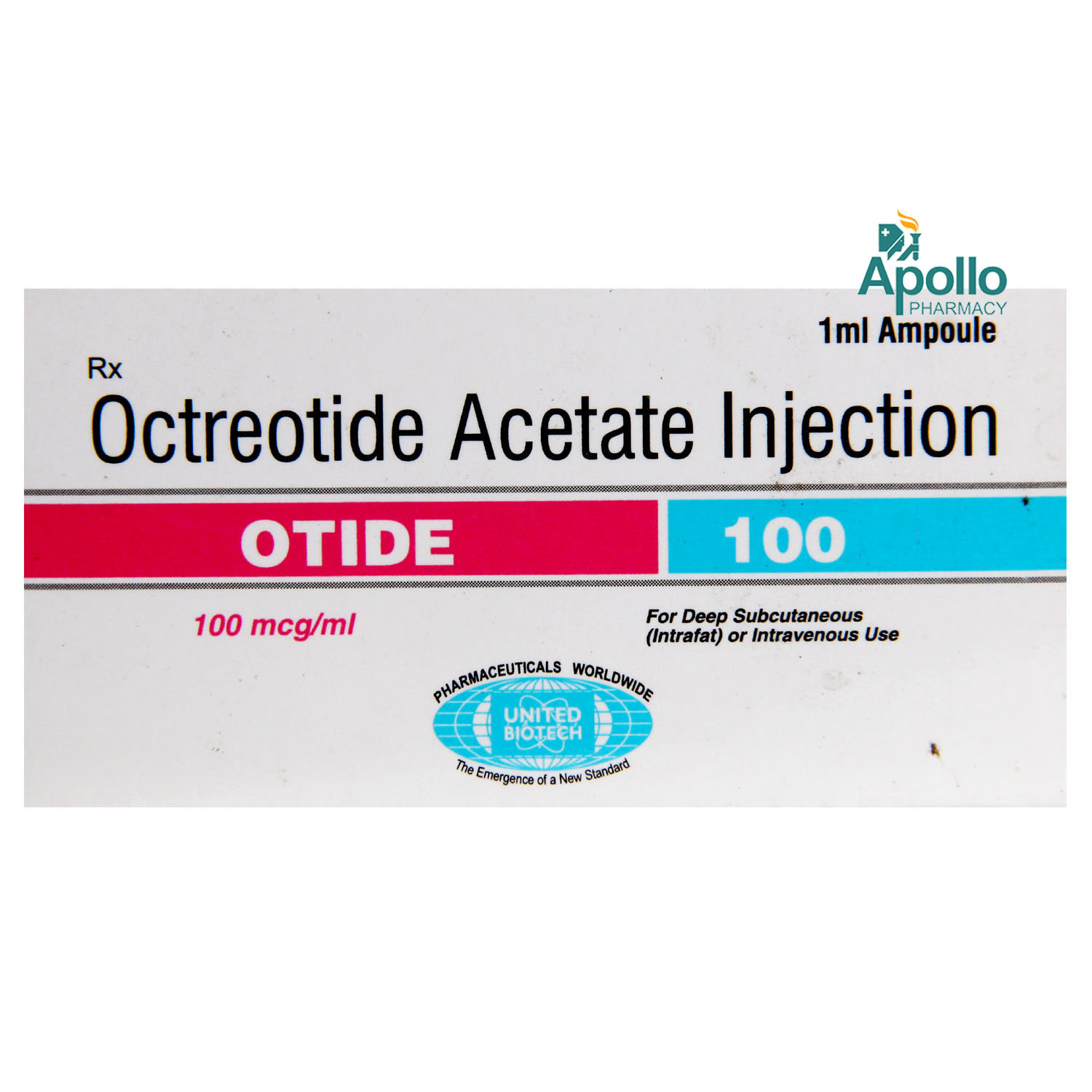Octreotide
About Octreotide
Octreotide belongs to a class of medicines known as octapeptides. Octreotide is primarily used to treat acromegaly. Octreotide is also used to decrease cleansing episodes and watery diarrhea produced by cancerous tumors (carcinoid tumors, vasoactive intestinal peptide tumors). Acromegaly is an illness caused by enhanced levels of growth hormone. It is a disease that causes the growth of feet and hands due to the unnecessary presence of growth hormones.
Octreotide contains ‘Octreotide’ which is a substance usually present in the human body which reduces the effects of specific hormones like growth hormone. It also decreases the bleeding from the food pipe by narrowing (constricting) the veins. Besides this Octreotide also reduces many substances in the body like glucagon and insulin (involved in controlling blood sugar) and chemicals that affect digestion.
Octreotide will be administered by a healthcare professional; do not self-administer. You may experience abdominal pain, diarrhea, constipation, nausea, headache, flatulence, gallstones, increased glucose level in blood and injection site reactions. Most of these side effects of Octreotide do not require medical attention and gradually resolve over time. However, if the side effects persist or worsen, please consult your doctor.
If you are known to be allergic to Octreotide or any other medicines, please tell your doctor. Octreotide should not be taken in the conditions like liver disease, or kidney disease. If you are pregnant or a nursing mother, it is advised to consult a doctor before using Octreotide. Octreotide should not be used for children below 18 years of age. Octreotide has negligible effects on the ability to drive and use machines. However, you may experience some side effects like tiredness and headache that may reduce your ability to drive.
Uses of Octreotide
Medicinal Benefits
Octreotide is primarily used to treat acromegaly. Octreotide is also used to decrease cleansing episodes and watery diarrhea produced by cancerous tumors. It also reduces the symptoms related to tumors of the gut (stomach, intestine). Besides this Octreotide is also used to prevent difficulties after surgery of the pancreas. It is also used to treat sudden reddening of the face and neck caused by several types of tumors. Octreotide is usually present in the human body which reduces the effects of specific hormones like growth hormone. It also decreases the bleeding from the food pipe by narrowing (constricting) the veins.
Directions for Use
Storage
Side Effects of Octreotide
- Abdominal pain
- Diarrhea
- Constipation
- Nausea
- Headache
- Flatulence
- Gallstones, leading to sudden back pain
- Increased glucose level in the blood
- Injection site reaction
- Changes in thyroid function tests
- Underactive thyroid gland (hypothyroidism)
- Slow heart rate.
Drug Warnings
If you are known to be allergic to Octreotide or any other medicines, please tell your doctor. Octreotide should not be taken in the conditions like heart disease, gallbladder disease, diabetes, high blood pressure and thyroid disease. Before taking Octreotide inform your doctor if you have complications like fever, abdominal pain, chills and yellowing of your skin or eyes. Octreotide should not be taken in the conditions like liver disease, kidney disease. If you are pregnant or a nursing mother, it is advised to consult a doctor before using Octreotide. Octreotide makes it easier for you to get pregnant even if you are unable to become pregnant before. Inform your doctor to avoid unwanted pregnancy and use birth control pills. Octreotide should not be used for children below 18 years of age. Octreotide has negligible effects on the ability to drive and use machines. However, you may experience some side effects like tiredness and headache that may reduce your ability to drive.
Drug Interactions
Drug-Drug Interaction: Octreotide may have interaction with antacids (cimetidine), anti-gout (pain in the joints) (allopurinol), medicines for heart disease (quinidine), antiallergic (terfenadine), antidiabetic (metformin).
Drug-Food Interaction: Octreotide may interact with some vitamins and nutritional supplements.
Drug-Disease Interaction: Octreotide should not be given to people with diabetes, gallbladder disease, heart disease, kidney and liver disease.
Drug-Drug Interactions Checker List:
Safety Advice

Alcohol
cautionIt is not known that Octreotide may interact with alcohol. Therefore, avoid drinking alcohol while using Octreotide.

Pregnancy
cautionOctreotide should not be taken until prescribed. Your doctor will weigh the benefits and any potential risks before prescribing it to you. Please consult your doctor.

Breast Feeding
cautionIt is not known that Octreotide may pass into breast milk. Hence, inform your doctor before taking Octreotide.

Driving
cautionOctreotide has negligible effects on the ability to drive and use machines. However, you may experience some side effects like tiredness and headache that may reduce your ability to drive.

Liver
cautionOctreotide to be taken with caution, especially if you have a history of Liver diseases/conditions. The dose may have to be adjusted by your doctor.

Kidney
cautionOctreotide to be taken with caution, especially if you have a history of Kidney diseases/conditions. The dose may have to be adjusted by your doctor.

Children
unsafeOctreotide should not be used for children below the age of 18 years as it is not approved for children.
Habit Forming
Diet & Lifestyle Advise
- Eat at least five pieces of vegetables and fruit in a day.
- Include a source of protein at every meal, like pulses (beans and peas), fish, eggs, and meat.
- Include a source of carbohydrates, like bread, potatoes, pasta (opt for wholegrain if possible), and rice.
- Eat breakfast and prevent snacking
- Try to eat a piece of fish at least two times a week
- Choose low salt, low fat, low sugar options
- Fired and oily food should not be taken as it might worsen your condition.
- Do mild to moderate exercise.
Special Advise
- Prolonged use of Octreotide may result in gallstone formation, if you know that you have gallstones now or have had them in the past inform your doctor immediately.
- Regular monitoring of blood sugar should be done, as Octreotide may cause fluctuation in blood sugar.
- Regular monitoring of vit B12 and inform your doctor about the results.
Patients Concern
Disease/Condition Glossary
Acromegaly: Acromegaly is an illness caused by enhanced levels of growth hormone. It is a disease that causes the growth of feet and hands due to the unnecessary presence of growth hormones. Acromegaly is generally caused by a non-cancerous tumor. The people who are middle-aged are most commonly affected.
Diarrhea: It is a condition in which bowel movements are too frequent leading to loose, watery stools. Acute diarrhea is a common problem and generally lasts for one or two days whereas chronic diarrhea lasts for four weeks. Diarrhea can be due to various reasons like diarrhea due to infection, tumors, antibiotics, a disease (inflammatory bowel disease), other medicines.
FAQs
Octreotide presents in the human body which reduces the effects of specific hormones like growth hormone. It also decreases the bleeding from the food pipe by narrowing (constricting) the veins. Besides this Octreotide also reduces many substances in the body like glucagon and insulin (involved in controlling blood sugar) and chemicals that affect digestion.
Octreotide should be stored in a refrigerator (2ºC-8ºC). Do not freeze. If stored below 25ºC, Octreotide is stable for 14 days if protected from light.
Octreotide may lead to an increased level of blood sugar. Therefore, Octreotide should be used with caution in patients with diabetes, only when prescribed by a doctor.
Yes, hair loss is a common side effect of Octreotide. Octreotide may also cause weight gain.
Some of the common side effects of Octreotide are, weight loss, severe upper stomach pain, diarrhea, numbness or cold feeling, warmth or irritation, weakness, unexplained muscle pain, weak pulse, loss of consciousness or slow breathing (breathing may stop).
If you miss a dose of Octreotide, take the missed dose as soon as you remember it. However, if it's almost time for the next dose, do not take a double dose to make up for a missed one.





